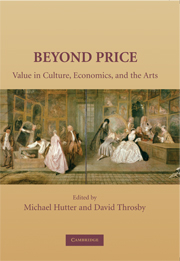Book contents
- Frontmatter
- Contents
- List of Contributors
- Preface
- 1 Value and Valuation in Art and Culture: Introduction and Overview
- PART ONE ORIGINS OF MEANING
- PART TWO THE CREATION OF VALUE IN ARTISTIC WORK
- PART THREE CONTINUITY AND INNOVATION
- PART FOUR APPRECIATION AND RANKING
- PART FIVE CULTURAL POLICIES
- Index
- Plate section
- Plate section
- References
1 - Value and Valuation in Art and Culture: Introduction and Overview
- Frontmatter
- Contents
- List of Contributors
- Preface
- 1 Value and Valuation in Art and Culture: Introduction and Overview
- PART ONE ORIGINS OF MEANING
- PART TWO THE CREATION OF VALUE IN ARTISTIC WORK
- PART THREE CONTINUITY AND INNOVATION
- PART FOUR APPRECIATION AND RANKING
- PART FIVE CULTURAL POLICIES
- Index
- Plate section
- Plate section
- References
Summary
Background
The guiding hypothesis on which this volume is based is that a distinction can be made between economic and cultural value, and that it is the nature of these twin concepts of value, how they are formed and how they relate or do not relate to each other, that needs to be investigated. These two concepts run like a leitmotiv through the volume, linking the chapters across the disciplinary boundaries.
To place the volume in its proper context, it is helpful to begin by looking over the historical evolution of ideas in this field, identifying the starting points and counterpositions from which the various chapters' arguments are derived. In the brief historical survey of the field contained in Section 2 of this chapter, we adopt a broadly chronological approach. Then in Section 3 we discuss the contemporary debate, dealing with literature mainly from the second half of the twentieth century to date. Finally in Section 4, we provide an overview of the volume and its contents.
Starting points in the literature
Debate about the relationship between cultural and economic value has been carried on in philosophy since Plato and Aristotle. Ancient thought claimed the attainability of a supreme value through the experience of bliss or divine pleasure; the experience of art played only a minor role in attaining that goal, and commercial action ranked even lower, being associated with the merely practical arts.
- Type
- Chapter
- Information
- Beyond PriceValue in Culture, Economics, and the Arts, pp. 1 - 20Publisher: Cambridge University PressPrint publication year: 2007
References
- 2
- Cited by



